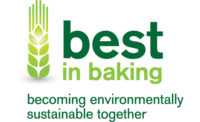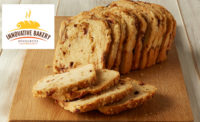2016 B.E.S.T. in Baking Program sets record for submissions

In today’s bakery industry, a diverse and wide-ranging collection of initiatives come together under the umbrella of environmental sustanability, touching on equipment design, bakery management, ingredient sourcing, product packaging, operational logistics and more.
The International Baking Industry Exposition’s (IBIE) 2016 B.E.S.T. in Baking Program, sponsored by Snack Food & Wholesale Bakery—with supporting sponsorship from AZO, Grain Craft and Pfannenberg—is designed to honor notable advancements across the bakery industry.
And judging by this year’s record-breaking program, the industry has been improving overall sustainability at a rapid pace during the three ensuing years since the last IBIE B.E.S.T. in Baking Program run.
Sustainable from farm to fork
The need for improved sustainability across the entire food industry has compelled farmers and ingredient suppliers to reanalyze entire food production systems, including organic and other sustainable agricultural practices, analyzing ingredient production, handling and processing rubrics to maximize resources and minimize deleterious impact on the environment. This has given rise to groups like the Roundtable on Sustainable Palm Oil, setting global standards for generating a sustainable supply of palm oil.
Meanwhile, ingredient processors and bakeries alike have worked toward reducing carbon footprints, with the ultimate goal of carbon neutrality; increasing use of solar power and low-emission lighting, as well as implementing cost- and energy-saving technologies like motion sensors for lighting; improving heat recovery and overall thermal management; and reducing and repurposing food waste. As a means to these diverse ends, programs like EPA’s EnergyStar and Green Power, LEED certification, and the Green Building Initiative provide pathways toward improved sustainability.
Several years ago, the American Bakers Association (ABA) launched the Energy Star Challenge with the goal of reducing the bakery industry’s energy footprint by 10 percent. ABA notes that four bakeries have now completed the challenge and over 100 more are working toward completion.
Progressive-minded bakeries seeking to maximize resources also continue to implement enterprise resource planning (ERP) software to streamline logistics efforts. These systems can improve the efficiency of bakery operations across the board—including ingredient and finished-product inventory, recipe/formula management, nutritional analysis, sales orders, shipping and receiving documentation, production scheduling, warehouse and freezer management, and fleet management.
Likewise, sustainable packaging initiatives continue to work toward reducing required levels of packaging materials—an approach that reduces the amount of packaging required by products, but also helps reduce required energy inputs throughout distribution. Also, packaging companies continue to develop solutions that better preserve food, naturally extending shelf life and freshness to result in reduced food waste. Use of more recyclable, biobased and/or compostable packaging will also help catalyze improved sustainability across the bakery industry.
A collective effort
The 2016 B.E.S.T. in Baking Program, a key part of the IBIE show taking place Oct. 8–11, 2016 in Las Vegas, focuses on Becoming Environmentally Sustainable Together (B.E.S.T.). For 2016, the program expanded beyond the previous equipment-only focus to include categories for sustainability achievements in bakery ingredients, packaging and logistics, as well as three awards for bakeries: wholesale bakeries under $50 million in annual sales, wholesale bakeries over $50 million in annual sales, retail bakeries. Submissions to the program are judged by industry experts guided by qualification criteria.
The 2016 B.E.S.T. in Baking judging panel consisted of:
- Joe Bove, vice president, The Stellar Group
- Siarl Dixon, certification manager, AIB International
- Dan Inman, director of quality and R&D, The Long Co.
- Jim Kline, president, The EnSol Group
- Mike Pierce, president, The Austin Co.
Response from the industry was dramatic. Submissions for the 2016 B.E.S.T. in Baking Program increased by over 170 percent compared to 2013. The 2016 B.E.S.T. in Baking judging panel will select one winner for each category, any notable honorable mentions within each category, and the submitted equipment, ingredients, packaging, logistics solutions and bakeries that qualify for the 2016 B.E.S.T. in Baking Program, earning the right to use the B.E.S.T. in Baking logo throughout the coming years.
Winners of the 2016 B.E.S.T. in Baking awards will gain significant exposure through IBIE-related press and on-site exposure at the IBIE show. Coverage of the winners form the central focus of a dedicated 2016 B.E.S.T. in Baking report as part of the September 2016 issue of <em>Snack Food & Wholesale Bakery</em>, distributed at IBIE and sent out digitally to the online Snack Food & Wholesale Bakery audience. The winners will also receive exposure in the B.E.S.T. in Baking Lounge in Las Vegas come October.
Snack Food & Wholesale Bakery and IBIE will announce the results of the 2016 B.E.S.T. in Baking Program judging in early September. For complete details on the B.E.S.T. in Baking Program, visit www.snackandbakery.com/IBIE2016 and look for the B.E.S.T. in Baking Awards link. And during IBIE 2016, make a point of visiting the B.E.S.T. in Baking Lounge to learn more about the top companies in bakery sustainability today.
2016 B.E.S.T. in Baking Program Criteria:
- Sourcing ingredients derived from renewable agricultural resources cultivated with environmentally sustainable farming practices
- Reducing the distance required to transport products, ingredients, packaging and/or equipment
- Reducing greenhouse gas emissions and the overall carbon footprint by replacing traditional lighting with energy-efficient alternatives; updating heating, ventilation and air conditioner systems; updating refrigeration and other equipment; reducing plant space requirements; and lowering plant air requirements
- Increasing the amount of recyclable materials used
- Reducing landfill impact
- Reducing water usage through use of efficient appliances, fixtures and fittings, as well as introduction of water-conserving landscaping outdoors</li>
- Advances in use of packaging with improved environmental dynamics, including reduced material usage, reduced distribution impact, and use of recyclable, renewable and/or compostable materials
- Reducing overall energy usage through active monitoring; efficient design and construction; use of efficient appliances, systems and lighting; use of renewable and clean sources of energy, generated on-site or off-site; and other innovative strategies, including LEED certification
Looking for a reprint of this article?
From high-res PDFs to custom plaques, order your copy today!






